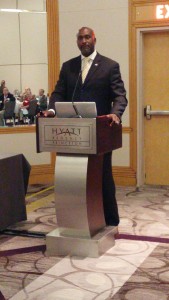Anderson Advocates for Transportation Equity at GMTMA Annual Meeting
November 10, 2015 | Community News, Statewide
 “Is transportation a contemporary civil rights issue?” That was the question posed by Dr. Darrin Anderson, deputy director of New Jersey Partnership for Healthy Kids (NJPHK), who served as the keynote speaker for the Greater Mercer Transportation Management Association (GMTMA) annual meeting. Held on Friday, October 23, the event was attended by more than 150 individuals representing policy makers, transportation professionals and local business leaders.
“Is transportation a contemporary civil rights issue?” That was the question posed by Dr. Darrin Anderson, deputy director of New Jersey Partnership for Healthy Kids (NJPHK), who served as the keynote speaker for the Greater Mercer Transportation Management Association (GMTMA) annual meeting. Held on Friday, October 23, the event was attended by more than 150 individuals representing policy makers, transportation professionals and local business leaders.
GMTMA is a non-profit, public-private partnership dedicated to improving mobility and reducing traffic congestion in and around Mercer and Ocean counties. GMTMA provides information, administers programs and assists commuters and residents with rideshare matching, bicycle and pedestrian programs, rail and bus travel information and incentives for commuters. NJPHK has partnered with GMTMA on on Safe Routes to School events, walking audits, and this year’s BikeFest at Greenwood Ave. Farmers Market which included bike safety training for children, free bike helmets, arm reflectors for adults and children, adult reflective vests, and a Boys & Girls Club Bike Exchange where used bicycles were sold for as little as $5.
During his remarks, Anderson contended that the United States Constitution sets forth the right to have good community health, which includes transportation. He also reflected back to the 1960’s Civil Rights movement indicating that in additional to racial equality, the movement was also about advocating for other social issues such as employment, affordable housing, equity, food access and public transportation. All of these issues are social determinants of health that prevent communities from reaching their full potential.
“Transportation is a crucial link to opportunity—connecting us to jobs, schools, housing, health care, and healthy food,” said Anderson. “Yet millions of low-income people, people with disabilities, and people of color live in communities where quality transportation options are unaffordable, unreliable, or inaccessible.”
“In order to ensure all communities have equal access to transportation, we need more advocates to take on this issue and fight for those who can’t fight for themselves,” concluded Anderson.
SHARE:
Contact Us: 609-278-9622
Follow Us On: